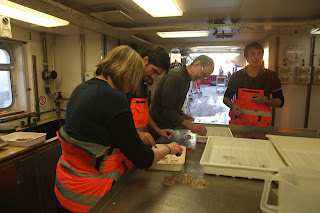Estamos a
escrever-vos do aeroporto de Heathrow (Londres, Reino Unido). Estamos num
cafezinho dentro do aeroporto, refugiados do frio (estes dias em Cambridge a
temperatura rondou sempre os -2 C, mas felizmente com céu limpo) e a ouvir umas
músicas bem relaxantes perfeitas para uma manhã de Domingo. Estamos rodeados por várias de dezenas de
pessoas e por vezes é surreal relembrar que há poucos dias atrás estávamos
longe daqui, de tudo e de todos, onde pinguins e as baleias imperam.

No último
dia nas Ilhas Falkland, após todo o dia a arrumar equipamentos, limpar
laboratórios e preparar relatórios, a Jen Thomas teve a excelente ideia de
sugerir irmos na manhã seguinte à colónias de pinguins gentoo, antes de
partirmos para apanhar o avião para o Reino Unido. Havia um pequeno senão. Era
a noite de gala do cruzeiro (ou seja, todos teríamos de socializar um pouco, já
em tom de despedida) e a possível partida teria de ser às 4 da manhã. Isto porque a colónia eram cerca de 1.30
horas de distância (ou seja, isto só de ida) e teríamos de estar de regresso às
8 da manhã para continuar com os trabalhos finais do cruzeiro.

Resumindo: às
3.30 da manhã lá estava eu, o José, a Jen e o Jon Watkins a tomar o pequeno
almoço. Para nós era fantástico ter o Jon connosco, não só porque ele já tinha
ido lá em anos anteriores (e sabia o caminho) mas também porque esta é
possivelmente a sua última expedição, pois irá reformar-se este Verão. Partimos
em noite escura, sem ver um palmo à frente da testa.

O vento era forte mas não muito frio. Há
medida que nos aproximávamos da colónia o dia acordava. O nascer do sol foi
magnifico, com cores lindas, dos azuis aos rosas/vermelhos. Lindo! Quando chegamos
à colónia, tínhamos os pinguins gentoo a chegar à praia e um pinguim rei
perdido no meio deles. Em fila indiana, uns a andar, outros a correr, o destino
era irem para o mar para mais um dia de pesca. Passámos 30-45 minutos
deliciados a presenciar o dia a desabrochar, rodeados de pinguins. Que bonito
dia para terminar a expedição. Como em segundos, regresso aqui ao aeroporto e
olho para as pessoas ao nosso lado (como vocês sabem agora :)). Nem imaginam as
aventuras e os segredos que os nossos olhares e sorrisos dizem.

We are writing to you from Heathrow airport (London,
UK). We are in a tiny café inside the airport, protected from the cold (these
days Cambridge has been flooded with temperatures below 0 C) and listening to
relaxing music perfect for Sunday morning. Having these dozens of people around
us (so many people!) is surreal as a few days ago we were far away from
everywhere, where penguins and whales are kings and queens. In the last day,
after another day of sorting out the equipments, cleaning the laboratories and
preparing reports, Jen Thomas had the great idea to suggest to go to the gentoo
penguins colony in the nst morning, before going to the airport. We thought
carefully, as that night we were having the cruise dinner (so everyone stay
later to socialize, already in a farewell mood) and the possible departure of
our adventure would have to be at 4am. This is because the colony is 1.3hours
distance (only to get there) and we would have to be back to the ship at 8am to
carry on with the final works. In a nutshell: at 3.30am we, Jen and Jon Watkins
were having breakfast.

For us, it was fantastic having Jon with us, not only
because he knew the way (he been in that colony in previous years) but also
because this could be his last trip South, as he is retiring this coming
Summer. So this would be VERY special to all of us! We left still in total
darkness, without being able to see anything beyond our noses. The wind was
strong but surprisingly warm. As we were getting closer to the gentoo colony, the
day was waking up. The sunrise was breathtaking, with magnificent colours
ranging from blues to bright reds. Beautiful. When we arrived at the colony, we
had hundreds of gentoo penguins queuing to go to sea, numerous in line like in a
supermarket line ready to pay and a king penguin lost in the middles of them.
Their destiny was to go for another day at sea, fishing for them and their
young penguins. We spent 30-45 minutes with them, enjoying every minute of the
sunrise and penguins everywhere. What a nice day to end our expedition. Like in seconds, as I finish writing these
lines, we return to our little cosy café in Heathrow airport, with people
passing by us every second. Surely they do not have the faintest idea of the
adventures and secrets that our eyes and smiles say...



















